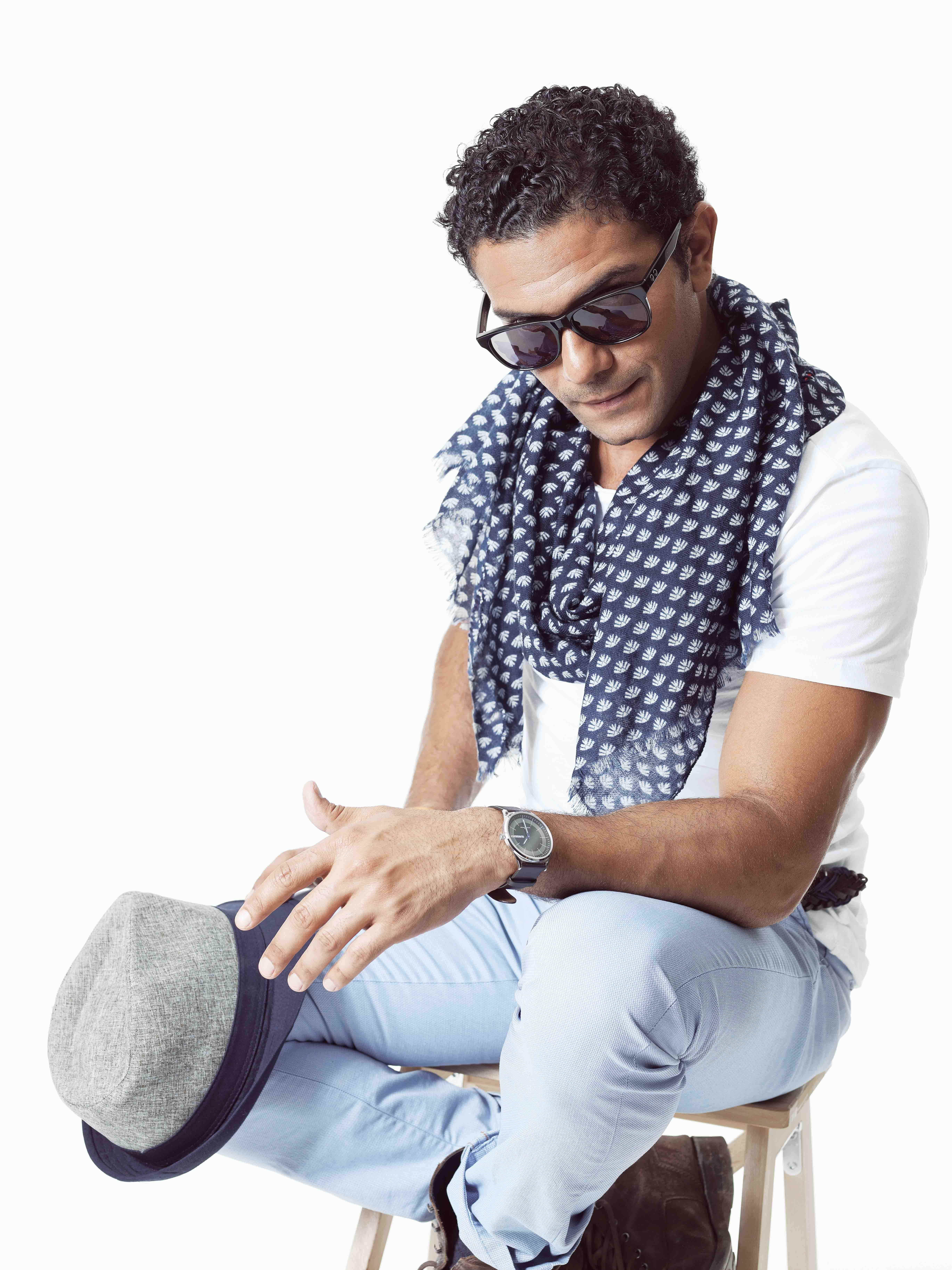The name Asser Yassin needs little introduction. After all, the actor has cemented his position as one of Egypt’s leading heartthrobs. With his popularity steadily rising over the years, Asser’s acting roles kept evolving-and so did his views on the business. A trained engineer who became an actor, Asser’s latest role sees him behind the camera directing one of Egypt’s most successful bands Wust El-Balad. We spoke to him about his career shift, his toughest roles and living in the “now”…

How did the collaboration with Wust El-Balad come about?
They have been friends of mine for a very long time. I’m a fan of Wust El-Balad in general. I love their music and I love their lyrics, and I had produced a song for Abu before in 2016, which they liked, so they told me, “Pick one from our album, and please, it would be a pleasure if you directed it.” I picked El Ekhtelaf El Mo2talef because I loved it, and I went on and I produced it, as well. I said, “I’m going to produce it, direct it and create everything in it, and actually work in it as an actor, too.” Projects like this turn into great memories for me later on. You never know where Wust El-Balad will be in ten year or where I’ll be in ten years. But projects like this provide something to look back at in the future.
What was the concept behind the clip?
El Ekhtelaf El Mo2talef is basically about how different we are and how similar we are in these differences. It’s about contradiction. For me personally, it’s about equalization between things. I believe in the balance of white and black, day and night, strong and weak, and I think humans should attain to be having the similar balance of that. You can’t just be strong without being weak. You cannot be as generous without being a bit in control. You have to have a balance of everything in life, so that you come to your own element, which is presence, and you reach that state of knowing your purpose. To me, that was the clip. That was the inspiration behind doing this. On a more basic level, the clip represents life and death. There’s revenge and empathy. We don’t know why the guy killed the whole band, but the band is avenging their death by sending a spirit that he falls for and she betrays him by poisoning him with a cup of coffee. It’s a very romantic way for the band to avenge their death!
How was your experience in directing it?
It was great. It was a long, 23-hour experience! It was also new for me to act and direct at the same time. I would fix the shot and then get in it. With a proper team, proper assistants and very good production, it was really good. It takes a good team to do that.
When did you first realize you were interested in acting?
When I was in university. I went to the American University in Cairo and I studied mechanical engineering. By mere coincidence, a friend of mine who knows my love for acting and cinema, in general, so he told me, “Someone left his role in the play. Why don’t you step in?” So I tried and I loved it. I went for it, and before graduating, I decided this is what I want to become actually – an actor. I don’t want to go on with engineering. I loved it but I wanted to become an artist.
How did you calculate the risk of starting a career in something totally different from your major?
I always tell this to anyone who wants to shift careers or to try something new, that I was raised with an engineering approach because my father is an engineer. We have a specific way with thinking and problem solving. If we want to achieve something, we study it and then go for it. I went to a million interviews and actually getting accepted in a lot of them. Mind you, I didn’t have the cash. After I graduated, I said I wouldn’t take any money from my parents, so I started taking some small gigs on the side, like management and organizational jobs, just to sustain myself. I told my father, by the end of this year, if I’m not supporting myself from acting, I’m not going to pursue it anymore. So for a year, I didn’t pursue any engineering jobs and was instead on the hunt for any acting experiences, even small ones in theater, short films, or any small role that I could get. I gave it my all, to be honest, and this why I’m here today. I was very worried at the time, but today, I’m really happy where I am. You’ll never find someone who is successful at something that he didn’t give his all in.
What has been the greatest challenge that has faced you throughout your career so far?
My biggest challenge was to love my work. I had reached a phase in my career, where I was just doing it because I was doing it. It’s really hard to enjoy what you’re doing sometimes, given that it becomes your career. When your hobby becomes your job, it’s really hard to maintain this love. It becomes about the money and position and so on. Thankfully, I restored my love for my work no matter what. Another goal is to maintain this passion for arts in general, as well.
How do you select your roles? Are there certain types of roles that you prefer to others?
My focus is usually on the film or the project itself. If I decide that it has the potential to make a difference, or be very entertaining or comic, then I get on board. For example, 30 Days, a show I acted in last year, had an impact on me personally. It was about someone getting punished everyday without knowing why, and the punishment was really ugly and intense. He started losing a lot of things everyday for thirty days until he knew the truth, but he became psychologically ill. It made think that if I meet anyone new, I have no idea what kind of baggage they are carrying, so I shouldn’t judge anyone. I have zero expectations from anyone. So, you learn things from your projects and people learn, too. At least, smart people do! I’m a believer in the concept that whatever I aspire for, it comes to me and vice versa. Sometimes, there are projects that I really want to be a part of but when they come, I don’t want them anymore. Some projects I’m not enthusiastic about also turn into something that I grow to love, so I can’t tell you that I know exactly what I’m looking for. For example, I was supposed to do Turab El Mass two years ago and it got postponed. I had refused a role in a series with a good wage for this role in the film and it got postponed, so I was getting disappointed until I told myself, “This is what you believe in and what you always talk about. You don’t know what’s good for you and what’s bad for you.” It turns out that it was the ideal option for me because when it was time to film it, I was much more artistically mature. With seven drafts in between, the film had become something entirely different, even better than what we were going to work with in the first place. I personally benefitted while filming it and was transformed as a human being. I learned to just give in to whatever comes with the flow.
Which was the toughest role to play? Why?
The role I’m doing now, which is Taha El Zahar. Another one was a drug addict, which was very intense. After shooting, I actually became really numb because it had affected me deeply. I missed the environment and even the room my character lived in. It also depends on the amount of details incorporated within the character. For my role as El Zahar, I have my own perfume, my own walk, and even a specific weight. I lost around six or seven kilos for this role. I stopped working out for months in advance. I played drums for a year and a half for just one day worth of shooting. It was intense.
Who are the local and international actors you look up to?
International I would definitely say Daniel Louis, Christian Bale. As for local, I would say, Mahmoud Abdel Aziz, Ahmed Zaki, Mahmoud Hemeida and Mahmoud Morsi. We have great talents here in Egypt.
What are your ambitions or goals that you aspire to?
I want to do as much as I can by producing art and having a positive influence. For a while, I used to think about building a legacy and leaving something for people to remember me by. Now, I just think about the present. It’s about what I can do now. I don’t care anymore about legacy because I won’t be there to watch how people remember me after I die. At first, my achievement was linked with becoming content, which is wrong. I should be content all the time, not only when I achieve something. Achievements simply came along the way as I kept moving forward. I like to stay active, acting, producing, and writing… If I’m not content, I wouldn’t be able to do them well or enjoy them, so I just chose to be content. Achievements, prizes and wages will come anyway.

By Sarah Guirguis



